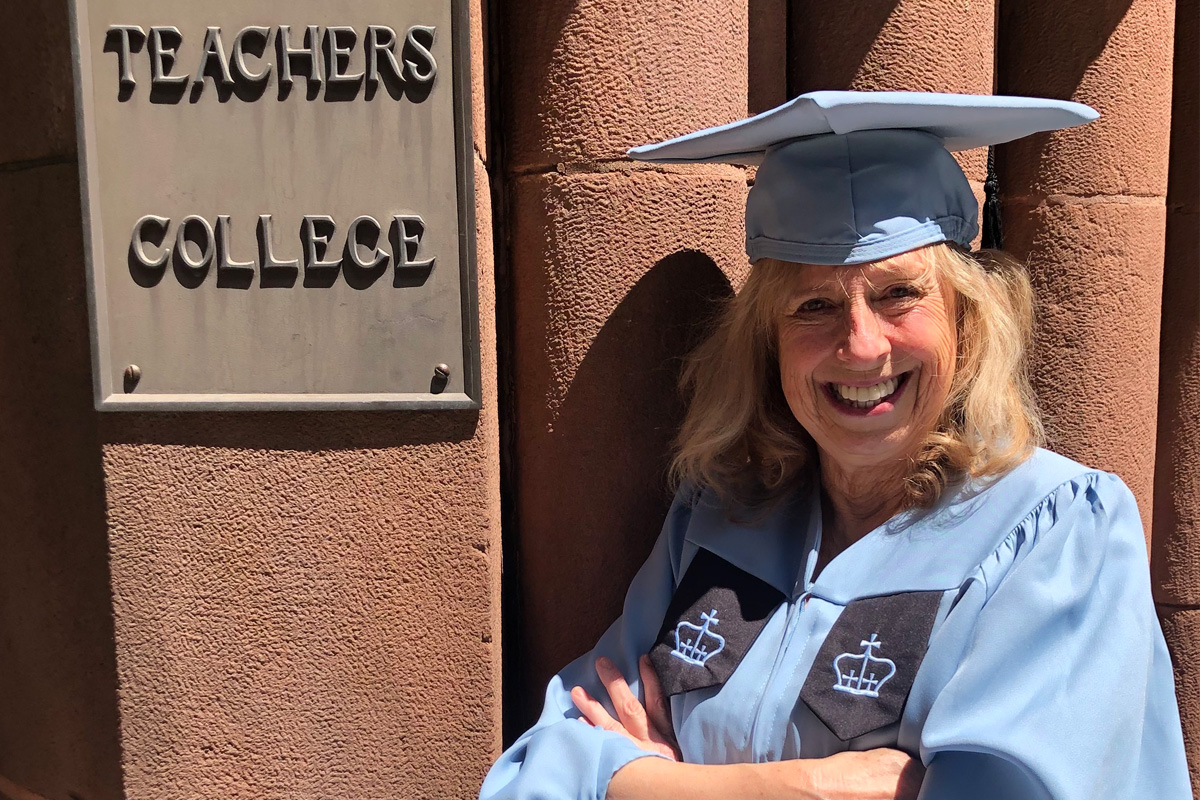So — what’s next for someone who’s earned a graduate degree while collecting Social Security?
As a sixty-something grandmother of four with a new master’s degree, Patricia Finnegan gets that question a lot — and she has her comeback line at the ready.
“That,” she says, “requires me to know what I want to be when I grow up.”
In one sense, Finnegan, who received her master’s in Developmental Psychology from Teachers College in May, has always known what interested her. But her focus shifted through the course of a complex life and some very difficult life challenges.
Graduates Gallery 2021
Meet some more of the amazing students who earned degrees from Teachers College this year.
For 25 years, Finnegan owned and operated Little Bear School, a San Francisco preschool she started in her home when she was pregnant with her fourth child and unwilling to “turn my tiny baby over to full-time day care.”
Depending on how you look at it, she either had the ideal background to create and operate a preschool, or none at all — she’d studied flute and piano at a community college and then toiled as a pole-climbing utility worker — but word quickly spread about the program that was sending children to kindergarten with first- and second-grade reading and math skills, and Little Bear School soon expanded, moving into its own space with a full staff teaching up to 80 kids a year.
For Finnegan, the school was an extraordinary “child observation lab.”
“When children get deep into their playthings you get to see them the way they really are,” she says. “It’s like being an anthropologist. You get to observe how humans act at that stage of development.”
When children get deep into their playthings you get to see them the way they really are. It’s like being an anthropologist. You get to observe how humans act at that stage of development.
—Patricia Finnegan (M.A. ’21)
But Finnegan’s relationship with the school was always tied to her relationship with Milo, the infant she’d been unwilling to leave in the care of a stranger.
Milo was 10 when doctors discovered that he had a heart defect. Five years later he underwent a heart transplant. As a young man, he became a dance instructor at Little Bear School and for the San Francisco public school district. But at age 25, his replacement heart failed. After Milo died, his mother decided that she needed to do something else with her life.
“I really associated the school with Milo,” Finnegan says. “It was really hard to go back to a place populated with moms. And it was hard for them as well, because a mother who loses a child becomes every other mother’s nightmare.”
The best way to honor Milo’s life, she concluded, was to formalize her lifelong study of children. She began an undergraduate degree at San Francisco City College, then graduated magna cum laude at California State University, East Bay, taking courses in anatomy, physiology, psychology and anthropology. A philosophy class sparked her interest in brain development in infants and young children, and she was able to land research assistant positions in labs at Cal State, East Bay and the University of California-Berkeley.
While considering several grad schools, the former owner of an open-structured preschool was drawn to TC’s program in Developmental Psychology, which encourages students to “create an individually-tailored program of study.”
“That is exactly what I did,” says Finnegan, who particularly credits Lecturer Laura DeRose and Professor of Neuroscience & Education Kimberly Noble for helping her chart her path. As a research assistant in Noble’s Neurocognition, Early Experience and Development (NEED) Lab, where much of the focus is on the impact of poverty and the neuroscience of adversity, Finnegan began to pursue a thesis on autism — one that she admits is controversial.
Instead of looking at autism as a single disability or system, I want to explore it in the context of an array of traits and behaviors over a range of intensities.
—Patricia Finnegan (M.A. ’21)
“Instead of looking at autism as a single disability or system, I want to explore it in the context of an array of traits and behaviors over a range of intensities,” she explains.
Building on the Broader Autism Phenotype — a group of autism-related traits such as mild impairments in social and communication skills, that has been well documented in undiagnosed family members of individuals with autism spectrum disorder — Finnegan wants to “examine the genetic origins and neural correlates of each discrete autism-related behavior, studying how they manifest in all children, not just those diagnosed as autistic.”
She is beginning this research now, building on her master's thesis, and hopes to eventually develop it through publishing, lecturing, teaching and possibly a doctoral thesis.
For now, Finnegan, who has sung professionally with jazz combos on stage and in nightclubs, intends to remain in New York to enjoy the city’s post-COVID cultural reawakening. But whichever direction she ultimately chooses, it’s clear that — like the city itself — this Teachers College graduate with a dream and a master’s degree is just getting started.
